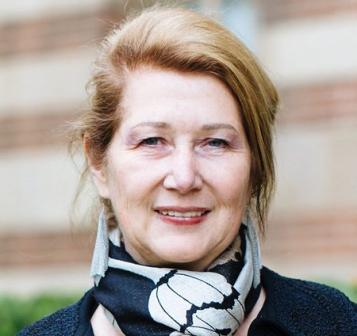
Carola Suárez-Orozco, PhD
Immigrant youth health researcher Carola Suárez-Orozco, PhD, a distinguished professor of counseling and school psychology at the University of Massachusetts Boston, will deliver the 2020 Evelyn Lee Visiting Scholar Lecture in Cultural Competency and Diversity on Tuesday, October 20, as part of the Department of Psychiatry and Behavioral Sciences’ Grand Rounds series.
Following her Grand Rounds presentation, Suárez-Orozco will also take part in a midday session for trainees on the topic of advocating for immigrant-origin children, youth, and their families. Both events will be held virtually via Zoom, and streaming links are available at psychiatry.ucsf.edu/lee.
Suárez-Orozco has been and continues to be interested in the ways in which the experience of immigration shapes children and their families. Her body of research uses mixed-methodological strategies to elucidate the child, adolescent, and young adult experience of immigration in order to examine learning and identity processes. Of late, her work is focused increasingly on classroom bias and bridging the compassion gap, especially as it relates to the immigrant-origin children and youth who now account for over a quarter of the student population.
Prior to joining the University of Massachusetts Boston faculty, she was a professor of human development and psychology at UCLA, where she was the principal investigator on a Spencer Foundation grant ("Making the Invisible Visible: Systematically Examining Classroom Bias") and a Ford Foundation grant ("Bridging the Compassion Gap: Addressing Social Inclusion for Immigrant Origin Children & Youth”).
Suárez-Orozco has been awarded an American Psychological Association (APA) Presidential Citation for her contributions to the understanding of cultural psychology of immigration, has served as chair of the APA Presidential Task Force on Immigration, and is a member of the National Academy of Education. She is the co-founder of Re-Imagining Migration and a former editor of the Journal of Adolescent Research. Her books include Children of Immigration, Learning a New Land, as well as the Transitions: The Development of the Children of Immigrants.
The annual Evelyn Lee Visiting Scholar Lecture in Cultural Competency and Diversity is sponsored by the UCSF Department of Psychiatry and Behavioral Sciences Diversity Committee in remembrance of Evelyn Lee, EdD, who served as a clinical faculty member for more than twenty years before her passing in 2003. In addition to her work at UCSF and San Francisco General Hospital, Lee served as executive director of San Francisco-area mental health agency Richmond Area Multi-Services and authored more than 30 publications fostering cultural competence and cross-cultural communication in mental health. The lectureship aims to further her mission of expanding diversity, equity and inclusion in the field of mental health by bringing prominent experts to share their experiences and expertise with campus trainees, faculty, and staff.
About UCSF Psychiatry and Behavioral Sciences
The UCSF Department of Psychiatry and Behavioral Sciences and the Langley Porter Psychiatric Institute are among the nation's foremost resources in the fields of child, adolescent, adult, and geriatric mental health. Together they constitute one of the largest departments in the UCSF School of Medicine and the UCSF Weill Institute for Neurosciences, with a mission focused on research (basic, translational, clinical), teaching, patient care, and public service.
UCSF Psychiatry and Behavioral Sciences conducts its clinical, educational, and research efforts at a variety of locations in Northern California, including Langley Porter Psychiatric Hospital; UCSF Medical Centers at Parnassus Heights, Mission Bay, and Mount Zion; UCSF Benioff Children’s Hospitals in San Francisco and Oakland; Zuckerberg San Francisco General Hospital and Trauma Center; the San Francisco VA Health Care System; UCSF Fresno; and numerous community-based sites around the San Francisco Bay Area.
About the UCSF Weill Institute for Neurosciences
The UCSF Weill Institute for Neurosciences, established by the extraordinary generosity of Joan and Sanford I. "Sandy" Weill, brings together world-class researchers with top-ranked physicians to solve some of the most complex challenges in the human brain.
The UCSF Weill Institute leverages UCSF’s unrivaled bench-to-bedside excellence in the neurosciences. It unites three UCSF departments—Neurology, Psychiatry, and Neurological Surgery—that are highly esteemed for both patient care and research, as well as the Neuroscience Graduate Program, a cross-disciplinary alliance of nearly 100 UCSF faculty members from 15 basic-science departments, as well as the UCSF Institute for Neurodegenerative Diseases, a multidisciplinary research center focused on finding effective treatments for Alzheimer’s disease, frontotemporal dementia, Parkinson’s disease, and other neurodegenerative disorders.
About UCSF
The University of California, San Francisco (UCSF) is exclusively focused on the health sciences and is dedicated to promoting health worldwide through advanced biomedical research, graduate-level education in the life sciences and health professions, and excellence in patient care. UCSF Health, which serves as UCSF’s primary academic medical center, includes top-ranked specialty hospitals and other clinical programs, and has affiliations throughout the Bay Area.





